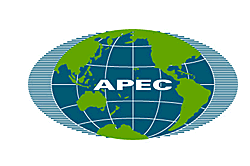

![]()


![]()
During the Young Entrepreneurs Seminar, young business people focussed on issues related to doing business in the Asia Pacific Region. In particular, they discussed themes that related directly to the official APEC SME Action Areas. These themes outline priorities on which APEC Industry Ministers are planning to take action. They are: access to market, access to information, access to technology, access to human resources and access to financing.
In detail...
Access, a key word that both the young entrepreneurs and the industry leaders focussed on, means being able use, reach or have something. For example, the word access is commonly used to refer to whether or not people who use wheelchairs can get in a building. If they are not able to get in, the building is called "inaccessible".
Access to market means being able to sell products or services to a group of people that reside in a different region. As consumers of products or services, groups of people in other regions are called markets.
Access to information includes finding accurate information on international trade restrictions, taxes and statistics as well as information on foreign markets. This kind of information helps small and medium business owners assess whether or not they would like to invest, market or manufacture their product in a given area. Small and medium businesses are particularly vulnerable because they often don't have the money to invest in long-term market studies.
Access to technology means being able to use available tools to their maximum potential. For example, if a person is exporting their product from their country to country Z, then that person will need to use the telephone to ensure their shipment has arrived in country Z safely.
Access to human resources refers to being able to find the people with the skills needed to work for small and medium entreprises. Many times business people have a hard time finding the people with the right qualifications. This theme addresses the fact that people need to build skills and train to work in small businesses.
Access to financing is a huge issue for small and medium entreprise. Often times, these business people are competing with big business and hundreds of other small businesses for a small amount of money to run their businesses. The amount of time it takes to get a business loan combined with all of the restrictions and conditions that the business owner has to comply with make financing difficult to get.
Questions for Discussion:
1. What barriers would small and medium business people in your community face? How do they overcome them?
2. What kind of skills do people need in order to work in small and medium businesses?
3. If you were a small business owner, how would you finance your business? What alternative sources of financing are available?
A glimpse of some of the discussion at the SME Young Entrepreneurs' Forum:
Challenges faced by Young Canadian EntrepreneursFrom the youth discussion, some elements clearly emerged as difficulties that Canadian young people face when doing business across international borders. For example, once a person has decided that they have a good product that would definitely sell in a specific market (based on market research), they then have to find a way to manufacture, transport, market and finance the product in order to access the market.
Questions for Discussion:
1. What are some of the challenges faced by Canadian youth wanting to do business in the Asia-Pacific Region?
2. How would doing business in the Asia-Pacific region benefit a young person's company or enterprise?
3. How could you learn more about how to do business in Asia Pacific?Click here to see one delegate's ideas
Credibility Issues for Young Entrepreneurs Doing Business in Asia
Credibility is a measure of how much people believe you and trust in your experience, skills and knowledge. Sometimes, no matter how hard you prepare, some people just don't feel good about investing in you because of their own prejudice. As young people working hard to promote their products and services overseas, these business people need to be aware of this barrier. Having credibility can really make or break big business deals, financing arrangements and partnerships.
Questions for Discussion:
1. How could young Canadian entrepreneurs gain credibility in both Canadian and Asian markets?
2. What could Canadian governments or businesses do to promote and support youth businesses?Click here to see one delegate's ideas
Tips for Canadian youth wanting to do business in Asia
Doing business in Asia is not like setting up a lemonade stand in the yard. There are many cultural and social differences that affect the way Asian people do business.
Questions for Discussion:
1. How does knowing the culture of another country help you to do business better?
2. Where or how can young people find out about business etiquette?Click here to see some tips written for youth
A Case in Point: Doing Business in China While Respecting Cultural Differences
One key to doing business is to have full background knowledge of what will be expected of you in cross-cultural business situations. At times, being confronted with different business practices and approaches can lead to serious misunderstandings.
Questions for Discussion:
1. How does language influence the way we behave and the way we understand each other?
2. Why is having a good translator important in doing business in another country?
3. How do you build relationships with potential business partners? Why is this important to do?
4. What other countries have cultures similar to that of China?Click here to see a speech presented during the Young Entrepreneurs Seminar
![]()
© 1997 - TG Magazine / The Students Commission
© 1997 le magazine TG / la Commission des Ètudiants